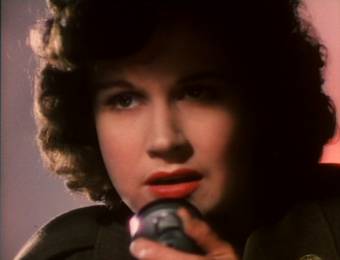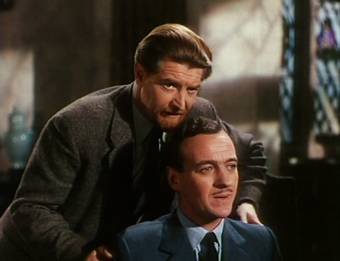|
Squadron
Leader Peter Carter is moments away from death. He is
aboard a stricken WW2 Lancaster bomber on fire, plunging
towards the English coastline. All his crew are dead.
He has torn ribbons for a parachute. All he can do is
jump (rather that "…than fry,"). Before
he abandons ship, an American service girl, June, talks
with him via radio. In the briefest of movie moments,
I fell in love with this couple and had a tear in my eye
as June desperately tries to find another way for Peter
to escape death. The exchange that always floors me (as
it did just now) finishes with June's words "I could
love a man like you." Wow. What power the simple
close up, actors who convince and writing that is heaven
sent. There is no greater honesty than the kind delivered
by those who know they're on their way out and in this
instance, that honesty turned into an aching, emerging
love despite the facts that (a) the couple had never met,
(b) to the fated couple there were to be no happy endings
and (c) it seems that the powers that be are sticklers
for the rule of law.

Heaven
(referred to only once by name by Richard Attenborough
as a young dead airman surveying an infinite celestial
civil service) is a sumptuous black and white bureaucracy
managed exclusively by women (angels?) who seem to busy
themselves measuring backs for the wings that seem to
be the other world's standard issue. Could this be an
early example of talented film-making men instinctively
knowing that if the women were in charge, it's really
our only hope, our only chance of heaven? But, what ho!
Peter's not turned up. His conductor to the after life,
an outrageously overblown French aristocrat who lost his
head, (played by Marius Goring) missed him in the fog
on the night in question. He must go back down to Earth
and bring Peter back.
Peter
wakes up on a beach and bemused but thoroughly of the
opinion that he is in the next world, he tries to report
in. 'Keep Out' reads the first sign of sense and in a
bold and original mise-en-scene, Powell has Peter's first
human contact, a naked goat herder playing a whistle,
an image that could be mistaken for Elysium purity and
innocence. It says a lot about our society (none of it
good) that no film-maker would be allowed to shoot this
scene today. In an astonishingly timed shot (come on,
this was 1947. Computers used punch cards and what we
have on our desks today could only fit in warehouses),
a bomber screams overhead as Peter realises he's alive
and in love. Peter now has to take on the powers that
be for the right to continue living and loving.
The
movie is crammed full of memorable characters, wry humour
and three central performances that would have given wings
to a concrete mixer. Niven is perfect as the handsome
hero with a keen but disturbed mind. Probably better known
as Zira in the Planet of the Apes series
of the 60s and 70s, Kim Hunter plays June with lusty and
affecting concern. Her friend Dr. Reeves (played by the
P & P regular, he of the honey voice, the utterly
marvellous Roger Livesey) fights for Peter's life in this
world and the next. The movie also asks the big 'what
if' question. It busies itself with spiritual matters,
with Peter (a published poet) fully supportive of the
idea of surviving human consciousness after death. The
fantasy aspects of AMOLAD (P & P's
movies have some fun acronyms. Try I Know Where
I'm Going or IKWIG) are consistent
with the basic tenets of Christian belief and the film
puts love above all earthly or heavenly concerns which
is as good a message as any. Love frustrates the bureaucrats
up there and down here – it's more a matter of love or
death but petty human traits and national prejudices also
surface, those determined to drag Peter up the Stairway
To Heaven (the US title) by hook or literal crook.
The
staging of Peter's hallucinations are notable by their
simple but very effective special effects. As I said,
this was almost 60 years ago but the movie starts with
a pan of (ahem) the universe. Ambitious much? The freeze
frame tableaux as Peter tries to warn his friends of his
visit from the conductor are wonderfully playful despite
the fact that an actor is incapable of standing completely
still unless made so by an optical printer. A mention
too for Alfred Junge whose astonishing designs don't manage
to date the production at all. The special effects are
notable for their sheer cheek. At one point the big heavenly
court scene pulls back to reveal itself as a galaxy of
stars (is that really where we go?). As an effect it is
very convincing despite the obvious mix halfway through
but it is the idea we applaud. CG could have made it perfect
but perfect is rarely great, merely perfect. As an idea,
the universal courtroom in Heaven is as bold as a puffed
up bullfrog on a motorway.

Apart
from one rather too tidy 'Deus Ex Machina' (let's just
say that a man needed another man's help but could only
get it if the other man died that night… you see
where I'm going with this?). But it's a small gripe (and
my relationship with this movie is such that it hurt me
to point it out) because the entire film is such a joy
and an intelligent joy at that. Along the way (in the
trial that will decide Peter's fate) the film changes
tack and starts to be a revelatory treatise on prejudice
and nationality. Let's be sure that love and Peter and
June's fate is never abandoned but the wit and intelligence
in these scenes (seemingly to affirm that we are all human
beings regardless of the props and national quirks) quite
takes one's breath away. Raymond Massey is the principal
American actor playing the prosecutor in the afterlife
and he is credible and eminently hissable.
Guess
what? Amor Vincit Omnia – love conquers all, even lawyers
from on high. A happy ending but then was that in any
doubt? A treasure of a movie made in the British milieu
of kitchen sink 'reality', a fantastic fantasy with intelligence
and wit.
Presented
in 4:3, the print is fair in quality with some slight strobing
in both the colour and black and white scenes as well as
exhibiting quite a few bits of dust and sparkle but never
to narrative detriment. It's a shame someone hasn't cleaned
up the best print available because the DVD version is only
a promise of things to digitally come. The Technicolor process,
so beloved by Powell (after all, the line "One is so
starved of colour up there" was altered to "Technicolor"
rather noticeably) can only be appreciated by seeing a sparkling
print projected in a cinema. There is a reason Jack Cardiff
is hailed for the superb craftsman he is and still to understand
this, you have to see these films projected.
A
basic but clear mono soundtrack has been faithfully encoded
to Dolby Digital with no noticeable special effects.
The
Colour Merchant (1998, documentary on cinematographer
Jack Cardiff – 9'54").
Cardiff's work with Powell and Pressburger is world class
but the most extraordinary and stunning revelation contained
in this enthusiastic memoir is to see the actual size of
the Technicolor camera in production stills (with sound
proofing blimp attached it was enormous, like a prototype
Mini). I mean to move the bloody thing, you'd have needed
a forklift truck. The other stunning aspect of the life
of Jack Cardiff (sadly not mentioned in the memoir) is the
diversity of his work in film over (get this) over nine
decades! And he's still working! Bravo. Got to get
me some of that DNA.
Just
to open those eyes a little wider, here are a few of Cardiff's
credits. It fair boggles the mind. But then, the man shot
for John Huston, Alfred Hitchcock (is there another Hitchcock?)
and Michael Powell…Check out the first three, one
classic after another.
A Matter of Life and Death (1946)
Black Narcissus (1947)
The Red Shoes (1948)
Under Capricorn (1949)
The African Queen (1951)
The Barefoot Contessa (1954)
The Vikings (1958)
The Girl on a Motorcycle (1968)
Death on the Nile (1978)
The Dogs of War (1981)
Ghost Story (1981)
The Wicked Lady (1983)
The Far Pavilions (1984) (mini) TV Series
Scandalous (1984)
Conan the Destroyer (1984)
Cat's Eye (1985)
Rambo: First Blood Part II (1985)
In-Depth Biographies
Repeated information about the three principals and Powell
and Pressburger, nothing you couldn't find in ten
minutes on the internet but a nice inclusion nonetheless.
|